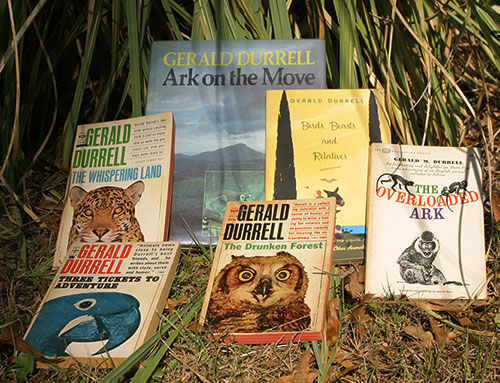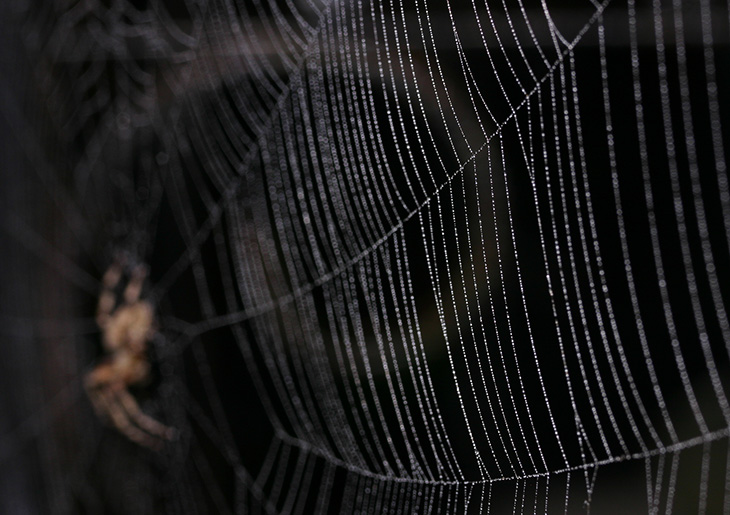
Just playing around the other evening while the holiday lights are up, trying a bunch of experiments. The raindrop on the lights was a subtle touch – while I’d like to do some shots against a nice layer of snow, that’s always an iffy thing at this latitude. I may annoy about half of the people in the country with this, but I was shooting in just a t-shirt (or is that tee-shirt?) Thursday night as I got this, and it was even warmer Friday. If it helps, The Girlfriend would have had at least a sweater on – it was 19°c (66°f) at 1 a.m.
The above shot required a little paying around; the soft globes are the neighbor’s lights across the road, rendered as round (and not hexagons) by using maximum aperture. They were significantly dimmer than the blue one of ours in the foreground, so this is a 1.3 second exposure, triggered with a long remote cord as I flipped the light switch so ours would be on for only part of the exposure. Any slight breeze would shake the wire and blur the closer blue one, and getting the right ratio of light levels was a timing thing, so I made several exposures. I even waited for a car to go past on the road, which would have painted some streaks across the bottom of the frame, but our road sees few cars at that time of night, and while I was waiting the neighbors shut their lights off for the evening.
 I also did lots of other night experiments, but none of them turned out quite the way I wanted; getting the light balanced for night exposures can be tricky, and the LCD on the camera is only partially useful in that regard – it doesn’t give a very good idea of exposure levels, especially not subtleties. During this I was trying to figure out why some of the images seemed to be coming up blurred, almost in a fog, while others were sharp without changing focus at all, until I realized my breath was sometimes fogging up the LCD ;-)
I also did lots of other night experiments, but none of them turned out quite the way I wanted; getting the light balanced for night exposures can be tricky, and the LCD on the camera is only partially useful in that regard – it doesn’t give a very good idea of exposure levels, especially not subtleties. During this I was trying to figure out why some of the images seemed to be coming up blurred, almost in a fog, while others were sharp without changing focus at all, until I realized my breath was sometimes fogging up the LCD ;-)
Some of my ideas required sitting down on the wet front steps, or shooting from ground level out in the yard, which meant I got more than a little damp, and still had nothing to show for it. I tried again on Friday evening, but by then the gentle breeze had become raging winds and nothing was going to hold still for a time exposure, plus we no longer had the wet conditions that provided raindrops and shiny surfaces. So, they’ll wait for another time.
Which brings us to these images from earlier in the day Thursday. When light is getting this dim from heavy overcast, it’s definitely recommended that you use a tripod. I’m sometimes as annoyed over fussing with them as anyone else, so I wasn’t using one here, and thus this is the only frame of five that was sharp enough. Had I wanted a little more depth-of-field I would have been out of luck, or forced to use the tripod, but even then it might have been difficult, since my position in among several trees was not exactly conducive to the wide leg spread. My primary tripod is a model that can mount the center column sideways as a horizontal arm, allowing a bit more flexibility, but this doesn’t fix every problem; the weight of the camera limits how far you can extend without some kind of counterbalance, and the arm works strictly horizontally. Often it’s easier to simply shoot a lot of frames and hope I was steady enough in at least one of them.
 A tripod would have been no real help with this one – it wasn’t the movement of the camera that was the biggest problem, but the gentle bobbing of the saturated plants in the breeze, so the “take lots of frames” technique was the only thing I could count on. In the foreground are the remains of the dog fennel plants, once towering over my head but now drooping from their age and burden of water, while in the lower background is one patch of pampas grass, still bright green but topped with their feathery gold fronds. The camera’s white balance for all of these was set for sunlight, which is essentially no compensation for the color of light. This keeps the blue-grey conditions accurate, which is what we expect to see with the rain; using Auto White Balance or the setting for overcast would have produced more neutral, warmer colors that reduced the atmosphere of the image.
A tripod would have been no real help with this one – it wasn’t the movement of the camera that was the biggest problem, but the gentle bobbing of the saturated plants in the breeze, so the “take lots of frames” technique was the only thing I could count on. In the foreground are the remains of the dog fennel plants, once towering over my head but now drooping from their age and burden of water, while in the lower background is one patch of pampas grass, still bright green but topped with their feathery gold fronds. The camera’s white balance for all of these was set for sunlight, which is essentially no compensation for the color of light. This keeps the blue-grey conditions accurate, which is what we expect to see with the rain; using Auto White Balance or the setting for overcast would have produced more neutral, warmer colors that reduced the atmosphere of the image.
When I selected the dripping tips as a subject, I shifted around a bit to see what background was going to work; I had the choice of open sky, bare tree branches, deep shade down below those branches, the lawn, and the pampas grass (not to mention a road and the neighbors’ houses, ruled out pretty quickly.) While I took a few different ones, this is the one that worked the best for me – there’s a hint of a hand reaching down, so the pampas grass had to represent an “object” as a target of the hand, which is another way of looking at the framing. Or you could just consider it as minimal interference between the dominant colors of the image, if that works. Any of these involved tiny shifts of position, and the belief that the background should work with the subject. The same holds true with both images above: the position of the lights at top required careful adjustments of the tripod, and the ivy leaves were specifically framed to extend across the corners, as well as giving a face-on aspect to the dominant leaf that used the short depth-of-field to advantage, preventing any part of it from going out of focus. The light angle also had to be a certain way to demonstrate the wetness of the ivy while not getting too much reflection that would wash out the colors and detail, something faintly visible in the third leaf. Even the dog fennel pic required finding a group of drops roughly in the same plane so the focus would be sharp for most of them, though one could also select a single drop to concentrate on, making it the focal point of the image by being the only sharp one.
But yes, hard work – exhausting, even ;-)





















































 Then she reappeared with a much more trim figure, and I knew I had missed it. In the days leading up to this, she had been found newly molted on one of the front patches of pampas grass (there are three, of two different species,) then spotted on the butterfly bush, a tomato plant, the rosemary bush (where she likely ate one of the
Then she reappeared with a much more trim figure, and I knew I had missed it. In the days leading up to this, she had been found newly molted on one of the front patches of pampas grass (there are three, of two different species,) then spotted on the butterfly bush, a tomato plant, the rosemary bush (where she likely ate one of the 

 Sometimes, the surface is as fine as a spider web, which are the best conditions to watch for because a frost-covered orb web is a great photo subject, as you might imagine. I have yet to find all those conditions in place myself – orb webs are often long gone by the time the frost conditions roll in – and to the best of my knowledge Jim hasn’t found them either.
Sometimes, the surface is as fine as a spider web, which are the best conditions to watch for because a frost-covered orb web is a great photo subject, as you might imagine. I have yet to find all those conditions in place myself – orb webs are often long gone by the time the frost conditions roll in – and to the best of my knowledge Jim hasn’t found them either. Which should make the conditions of this next image very obvious – I’m guessing that Jim was working just as the sun broke through, because there’s still frost visible and I imagine it didn’t last long. Either that or it was freakin’ cold. As indicated in the previous post, these are higher contrast conditions – note the bright highlights and distinctive shadows, giving some enhancement to the shape of this seed pod. It also made the bare branches in the background stand out a bit sharper, slightly distracting – much more and it would be working against the image too strongly. Ideally, this is where you try to find a dark background, like a patch of shade, to position behind the seed pod, using that contrast to really make it stand out, but such things can be hard to accomplish. Here’s a sneaky little trick, if you’re prepared: put the camera on a tripod, using a remote shutter release if necessary, and use your own shadow to provide the darker background.
Which should make the conditions of this next image very obvious – I’m guessing that Jim was working just as the sun broke through, because there’s still frost visible and I imagine it didn’t last long. Either that or it was freakin’ cold. As indicated in the previous post, these are higher contrast conditions – note the bright highlights and distinctive shadows, giving some enhancement to the shape of this seed pod. It also made the bare branches in the background stand out a bit sharper, slightly distracting – much more and it would be working against the image too strongly. Ideally, this is where you try to find a dark background, like a patch of shade, to position behind the seed pod, using that contrast to really make it stand out, but such things can be hard to accomplish. Here’s a sneaky little trick, if you’re prepared: put the camera on a tripod, using a remote shutter release if necessary, and use your own shadow to provide the darker background.

 First and foremost, and something I teach my students right off the bat, is that photographs by nature have increased contrast over what we see through our eyes. They have a narrow dynamic range, a term that straddles the border between explanatory and pompous. We all know, for instance, that dogs can hear higher pitches than we can, and perhaps you know that we only see a narrow spectrum of light, unable to discern infra-red and ultra-violet ourselves, much less gamma rays or microwaves. Well, the camera’s much worse than we are, partially because of sensitivity, but mostly because of the limitations of the medium. You can aim right at the sun and get a shot (not recommended actually,) but printed on paper or glowing from a monitor, it will never make anyone look away in tears – it will simply be white. The image has to dump a lot of brightness levels just to work.
First and foremost, and something I teach my students right off the bat, is that photographs by nature have increased contrast over what we see through our eyes. They have a narrow dynamic range, a term that straddles the border between explanatory and pompous. We all know, for instance, that dogs can hear higher pitches than we can, and perhaps you know that we only see a narrow spectrum of light, unable to discern infra-red and ultra-violet ourselves, much less gamma rays or microwaves. Well, the camera’s much worse than we are, partially because of sensitivity, but mostly because of the limitations of the medium. You can aim right at the sun and get a shot (not recommended actually,) but printed on paper or glowing from a monitor, it will never make anyone look away in tears – it will simply be white. The image has to dump a lot of brightness levels just to work.




 I thought to check on my green lynx spiders, who had weathered the chill with aplomb (go ahead, picture a spider with aplomb.) This is the first time I never saw mama – she had been looking so decrepit that I was always surprised to find her still around, up until now – but the younguns ventured out as soon as the sun warmed their little chitins. Leaves blown by the wind into the protective cluster of weblines around the former egg sac get incorporated into the shelter, tacked down (I think entirely by accident) with the draglines left by the spiderlings swarming all over them. Still, it’s not much of a shelter when the temperatures drop this far, and I’m impressed with the spiders’ ability to endure the sub-freezing conditions and bounce right back with a little sunlight. There’s fewer of them now, at least some having dispersed by ballooning, but the other two hatchings that I’d observed have vanished almost entirely, so this one has been curiously stable. I plan to keep an eye on it and see what happens – I’m pretty sure these are the offspring of the hatching I observed last year, so they have to do something for the winter.
I thought to check on my green lynx spiders, who had weathered the chill with aplomb (go ahead, picture a spider with aplomb.) This is the first time I never saw mama – she had been looking so decrepit that I was always surprised to find her still around, up until now – but the younguns ventured out as soon as the sun warmed their little chitins. Leaves blown by the wind into the protective cluster of weblines around the former egg sac get incorporated into the shelter, tacked down (I think entirely by accident) with the draglines left by the spiderlings swarming all over them. Still, it’s not much of a shelter when the temperatures drop this far, and I’m impressed with the spiders’ ability to endure the sub-freezing conditions and bounce right back with a little sunlight. There’s fewer of them now, at least some having dispersed by ballooning, but the other two hatchings that I’d observed have vanished almost entirely, so this one has been curiously stable. I plan to keep an eye on it and see what happens – I’m pretty sure these are the offspring of the hatching I observed last year, so they have to do something for the winter.



 After a frantic ride of perhaps 10mm, the smaller one was eventually dislodged and tumbled to a stop, miraculously unharmed, as the larger snail thundered away blithely. I waited for a short while to get some pics of the smaller one emerging and toddling off, if only to ensure that it was not limping (picture that if you will.) If you look closely at this image, you can just see the eyestalks emerging to the far right, but after its traumatic ride the snail was understandably cautious and taking its own sweet time about it, which I will leave you to imagine. The sun was bright today and this isn’t ideal conditions for snails, so after a quick spritz of water, I soon returned them all to the shelter of the rocks whence they came, where I’m sure the stories will be traded this evening over long draughts of whatever it is that snails quaff.
After a frantic ride of perhaps 10mm, the smaller one was eventually dislodged and tumbled to a stop, miraculously unharmed, as the larger snail thundered away blithely. I waited for a short while to get some pics of the smaller one emerging and toddling off, if only to ensure that it was not limping (picture that if you will.) If you look closely at this image, you can just see the eyestalks emerging to the far right, but after its traumatic ride the snail was understandably cautious and taking its own sweet time about it, which I will leave you to imagine. The sun was bright today and this isn’t ideal conditions for snails, so after a quick spritz of water, I soon returned them all to the shelter of the rocks whence they came, where I’m sure the stories will be traded this evening over long draughts of whatever it is that snails quaff.
